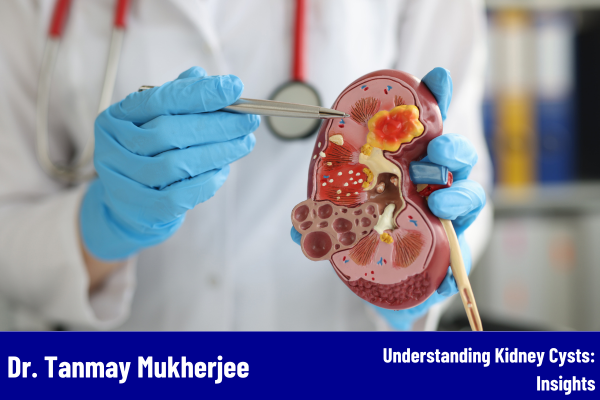
Understanding Kidney Cysts: Insights from Dr. Tanmay Mukherjee
Explore essential information about kidney cysts with Dr. Tanmay Mukherjee, Kolkata's leading nephrologist and renal transplant physician. Learn about symptoms, diagnosis, and treatment options.
Dr. Tanmay Mukherjee
9/4/20242 min read


Understanding Kidney Cysts: Insights from Dr. Tanmay Mukherjee
Kidney cysts are fluid-filled sacs that can develop in one or both kidneys. They are often discovered incidentally during imaging tests for other conditions. Dr. Tanmay Mukherjee, a leading nephrologist and renal transplant physician in Kolkata, provides a comprehensive overview of kidney cysts, including their types, symptoms, diagnosis, and treatment options.
What is a Kidney Cyst?
A kidney cyst is a sac filled with fluid that forms on or in the kidneys. These cysts are generally benign (non-cancerous) and can vary in size from tiny to several centimeters in diameter. While most kidney cysts do not cause symptoms or health problems, some can lead to discomfort or complications, particularly if they grow large or become infected.
Types of Kidney Cysts
Simple Kidney Cysts: These are the most common type and are usually benign. They have a thin wall and are filled with clear fluid. Simple kidney cysts often do not require treatment unless they cause symptoms.
Complex Kidney Cysts: These cysts have thicker walls and may contain debris or solid components. They are less common and may require further evaluation to rule out more serious conditions, such as kidney cancer.
Polycystic Kidney Disease (PKD): This is a genetic condition where multiple cysts form in the kidneys over time. PKD can lead to kidney dysfunction and other complications.
Symptoms of Kidney Cysts
Most kidney cysts are asymptomatic and are discovered incidentally during imaging studies for other issues. However, larger or problematic cysts may cause:
Pain: Typically in the lower back or abdomen.
Swelling: In the abdomen or side.
Blood in Urine: Hematuria may occur.
Frequent Urination: Increased need to urinate.
Infection Symptoms: Such as fever and painful urination if the cyst becomes infected.
Diagnosis of Kidney Cysts
Diagnosis of kidney cysts involves several key steps:
Medical History and Physical Examination: To assess symptoms and check for signs of kidney issues.
Ultrasound: The primary imaging test for visualizing kidney cysts, distinguishing between simple and complex types.
CT Scan or MRI: May be used for more detailed imaging and to evaluate complex cysts.
Urinalysis: To check for blood or infection in the urine.
Blood Tests: To assess kidney function and overall health.
Treatment and Management
The treatment for kidney cysts depends on their size, type, and whether they cause symptoms:
Observation: Simple kidney cysts that do not cause symptoms or complications typically require no treatment and are monitored with periodic imaging.
Medication: Pain relief and treatment for infections if necessary.
Aspiration: For symptomatic cysts, a needle may be used to drain the fluid from the cyst, providing relief from discomfort.
Surgery: In cases where the cyst is large, complex, or causing significant symptoms, surgical intervention may be needed to remove it.
Polycystic Kidney Disease Management
For polycystic kidney disease, management includes:
Regular Monitoring: To track kidney function and cyst growth.
Blood Pressure Control: Managing hypertension to slow disease progression.
Lifestyle Changes: Such as dietary modifications and fluid intake adjustments.
Kidney Transplant: In advanced cases, where kidney function is severely compromised.
Conclusion
Kidney cysts are a common finding and, in most cases, are benign and asymptomatic. Dr. Tanmay Mukherjee, a leading nephrologist and renal transplant physician in Kolkata, emphasizes the importance of accurate diagnosis and appropriate management of kidney cysts. By understanding the nature of kidney cysts and working closely with healthcare professionals, patients can effectively manage their condition and maintain optimal kidney health.
Dr. Tanmay Mukherjee
Leading Nephrologist & Renal Transplant Physician in Kolkata. With more than 15 years of experience as a top nephrologist.
Contact us
Quick links
360, Panchasayar Rd, Sahid Smirity Colony, Pancha Sayar, Kolkata, West Bengal 700094
© 2024. All rights reserved.
